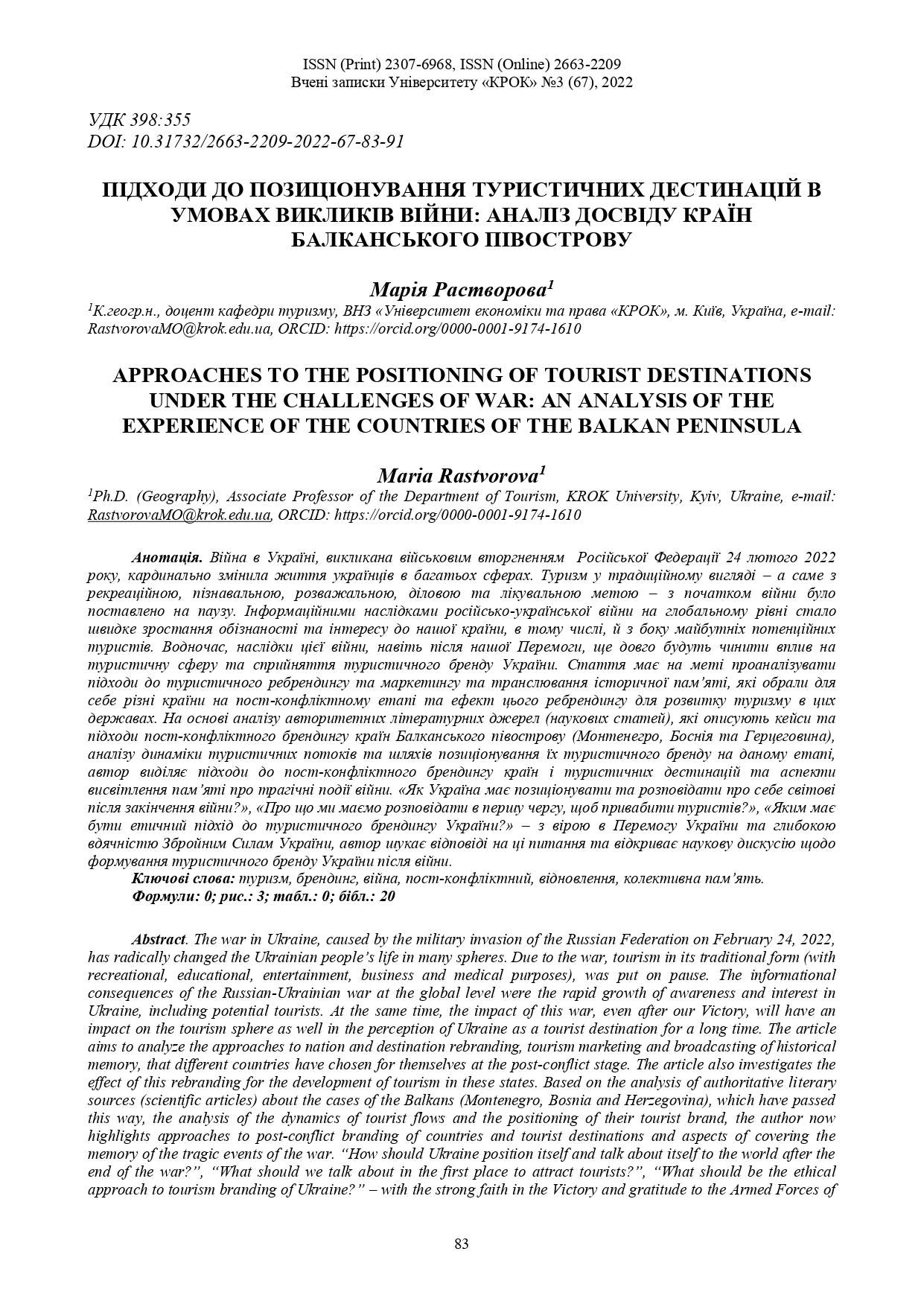APPROACHES TO THE POSITIONING OF TOURIST DESTINATIONS UNDER THE CHALLENGES OF WAR: AN ANALYSIS OF THE EXPERIENCE OF THE COUNTRIES OF THE BALKAN PENINSULA
DOI:
https://doi.org/10.31732/2663-2209-2022-67-83-91Keywords:
tourism, branding, war, post-conflict, recovery, collective memoryAbstract
The war in Ukraine, caused by the military invasion of the Russian Federation on February 24, 2022, has radically changed the Ukrainian people’s life in many spheres. Due to the war, tourism in its traditional form (with recreational, educational, entertainment, business and medical purposes), was put on pause. The informational consequences of the Russian-Ukrainian war at the global level were the rapid growth of awareness and interest in Ukraine, including potential tourists. At the same time, the impact of this war, even after our Victory, will have an impact on the tourism sphere as well in the perception of Ukraine as a tourist destination for a long time. The article aims to analyze the approaches to nation and destination rebranding, tourism marketing and broadcasting of historical memory, that different countries have chosen for themselves at the post-conflict stage. The article also investigates the effect of this rebranding for the development of tourism in these states. Based on the analysis of authoritative literary sources (scientific articles) about the cases of the Balkans (Montenegro, Bosnia and Herzegovina), which have passed this way, the analysis of the dynamics of tourist flows and the positioning of their tourist brand, the author now highlights approaches to post-conflict branding of countries and tourist destinations and aspects of covering the memory of the tragic events of the war. “How should Ukraine position itself and talk about itself to the world after the end of the war?”, “What should we talk about in the first place to attract tourists?”, “What should be the ethical approach to tourism branding of Ukraine?” – with the strong faith in the Victory and gratitude to the Armed Forces of Ukraine, the author seeks answers to these questions and opens an academic discussion on the formation of the tourism brand of Ukraine after the war.
Downloads
References
Лейпер Н. (2008). Чому «індустрія туризму» вводить в оману як загальний вислів: аргумент на користь варіації у множині «галузі туризму». Tourism Management, 29, 237-251.
Скотт Н., (2005). Лоуз E. Туристичні кризи та катастрофи: покращення розуміння системних ефектів. Журнал маркетингу подорожей і туризму. 2(3), 37-41.
Альварес, М. Д. , Кампо, С. (2014) Вплив політичних конфліктів на імідж країни та намір відвідати її: дослідження іміджу Ізраїлю, Tourism Management, 40, 70-78.
Вітіч A.C., Рінгер Г. (2008). Брендування постконфліктних напрямків. Journal of Travel & Tourism Marketing 23 (2-4), 127-137
Морган Дж. Н., Прітчард А. та Піггот Р. (2003). Брендування напрямків і роль зацікавлених сторін: приклад Нової Зеландії. Journal of Vacation Marketing 9(3), 285-299.
Новеллі М., Морган Н. Дж. та Нібігіра К. (2012). Туризм у постконфліктній ситуації крихкості, Annals of Tourism Research, 39(3):1446–1469
Корстанже М.Є. та Іванов С. (2012). Туризм як форма нової психологічної стійкості: зародження темного туризму. Культура, (06) 04, 56–70.
Каусевич С. та Лінч П. (2011). Туризм у Феніксі: роль постконфліктного туризму. Annals of Tourism Research. 38 (3), 780-80.
Милованов організовує вечір з фільтраційною зоною і пропонує відчути досвід війни. Українці обурюються // Українська Правда. 11.06.2022. Електронний ресурс. – Режим доступу: https://life.pravda.com.ua/society/2022/06/11/249070/
ДАРТ закликає компанію взятися від «темного туризму» – Офіційний веб-сайт Державного агентства розвитку туризму (18.08.2022). Електронний ресурс. – Режим доступу: https://www.tourism.gov.ua/blog/dart-zaklikaie-kompaniyi-utrimatis-vid-temnogo-turizmu
Боннен, Пребен (2003). До спільної європейської політики безпеки та оборони: шляхи та засоби її втілення в життя. LIT Verlag Берлін-Гамбург-Мюнхен. – С. 188.
Міжнародний туризм, кількість прибуттів – Монтенегро. Електронний ресурс. Режим доступу: https://data.worldbank.org/indicator/ST.INT.ARVL?locations=ME
Міжнародний туризм, кількість прибуттів – Боснія та Герцеговина. Електронний ресурс. Режим доступу: https://data.worldbank.org/indicator/ST.INT.ARVL?locations=BA
Тур військовим Сараєво. Інформаційний портал Travel Bosnia. Електронний ресурс. Режим доступу: https://travel-bosnia.ba/sarajevotours.php?open=war-tour
Тунель надії (музей війни). Інформаційний портал Travel Bosnia. Електронний ресурс. Режим доступу: https://travel-bosnia.ba/sarajevotours.php?open=tunnel
Флойд М. Ф. та Пеннінгтон-Грей Л. (2004). Профілювання сприйняття ризику туристами. Annals of Tourism Research, 31 (4), 1051-1054.
Річі, Дж. Р. Б. і Крауч, Г. І. (2000). Конкурентоспроможний напрямок, стійка перспектива, Tourism Management, 21(1), 1-7.
Історія Монтенегро. Офіційний туристичний портал Монтенегро. Електронний ресурс. Режим доступу: https://www.visit-montenegro.com/montenegro/history/
Йоханссон, М. (2012) Брендинг місця та уява: політика переосмислення міста-саду. Урбаністичні студії. 49 (16), 3611-3626. – С. 3612.
Леннон Дж. і Фолі М. (2000). Туризм: привабливість смерті та катастроф. Лондон: Континуум.

Downloads
Published
How to Cite
Issue
Section
License
Copyright (c) 2022 Марія Растворова

This work is licensed under a Creative Commons Attribution 4.0 International License.

